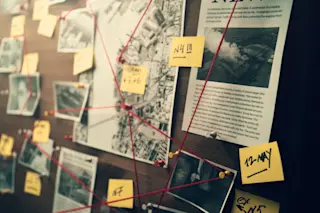Update: Just learned the American Academy paper will be available for download at this link tomorrow. But don't go now, it just gives an error message....
Well, the piece yesterday prompted a lot of commentary on the blogs, on Facebook, on the Post website (214 last time I checked), and through emails directly to me. I want to make some remarks on some of the more interesting--and less interesting--reactions that I received. First, though, a factual point: A lot of folks have asked when the American Academy of Arts and Sciences paper that all of this is based on will be available. The answer is Tuesday, and while this paper is being printed in hard copy--technically an "occasional paper" of the American Academy of Arts and Sciences--an online PDF will also be available. I will link as soon as that occurs. (Tuesday is also day the paper is being rolled out at the other AAAS--American Association for the Advancement of Science--and once again, details on the event are here.) So, on to the responses. First, the ones I don't find all that interesting:
1. I've gotten a lot of emails where there's special pleading being done either about climate change, or about vaccination. People are saying, "Yeah, you're right, except on my pet issue." Well, I'm sorry--but I and many others have been down both of these roads a million times. What I wrote is representative of scientific consensus in both areas, and that's enough to say for now, lest we get distracted from the actual point of the article (which is applicable to many other contested scientific issues than just these two super, hyper contested ones).
2. Some people completely miss the point and simply reassert that conflicts between scientists and the public occur because people are ignorant or stupid. So for instance, one of our frequent commenters, GM, says, "For the 145895486th time: if someone’s political views trump scientific facts, then this person is scientifically illiterate and a victim of poor science education. How hard is that to understand?" It's easy to understand as an idea. But it's also unhelpful, and in my opinion wrong. Further, the whole point of my article is to show why matters are much, much more complicated--and why the sentiment GM expresses doesn't get us anywhere. So, please, read the article.
Now, on to the interesting stuff--or even, in some cases, the fascinating stuff. I'm a bit honored that my piece drew a comment
from Cornell University science communication prof Bruce Lewenstein
, who apparently made a similar point to mine in the 1980s, and was reproached for it by none other than Isaac Asimov! Lewenstein reports that when he argued that we should “present science without demanding that nonscientists accept the scientific world view", Asimov countered, “Does [Lewenstein] want us to explain that photosynthesis works by magic? That if we pray hard every night a cancer will cure itself?...By Newton, I’d rather be ‘arrogant’ than stupid.” It's not only an unforgettable quotation from an unforgettable writer--but it also epitomizes the mindset that I (and, I think, Lewenstein) are trying to modify. Look, folks--Asimov was a genius. I love his books, and I know I'm not the only one. But setting things up as "'arrogant' vs 'stupid'" is a false dichotomy. I would argue that we need the ignorant to be more humble, and for the smart or highly informed to be more understanding of those who lack the same intellectual training or advantages they have. That's the point I was trying to make (and perhaps Lewenstein was too). Another great response came in from PalMD over at the White Coat Underground
. First, PalMD argues that not all scientists are so naive about what's driving the public. Or as he puts it, "Those of us arguing for sound science policy are not ignorant of ideologies and of our own inabilities to sway true believers. We get that. But neither do most of us believe we can simply open up science policy to a vote." I appreciate the point--and of course, I also know that not all scientists think as GM does above (or, more memorably, as Asimov does). However, many certainly do. I know this in part because of the kind of response an article like this draws: Praise, but also quite a lot of defensiveness and reassertions that the problem is the public--and how dare you blame honest scientists who are doing the best they can? In fact, my argument (and Sheril's argument, when it comes to Unscientific America) makes some scientific critics so upset that they claim we're ignoring the obvious problems with the public, or the educational system, or the media--when of course we're not. We've always said it's a two way street, a two cultures problem, and responsibility is spread all around. We've never neglected the role of the media. We've never neglected the problem of political cynicism or abuse of science. PalMD also raises the question of the public's role in science policy. To be clear, I don't think the nonscientist public has any role in determining what the scientific facts are. However, that is very different than saying it has no role at all. It needs to be included, and it needs to be listened to--and those who ignore it are going to find their own policy goals thwarted, I'll wager. And PalMD has some other, very good points. For instance, he observes that when we're communicating about the facts of science, we're not just trying to reach the unreachable folks. We're trying to reach our allies. We're trying to reach policymakers. We know the deniers aren't going to be coming out of denial any time soon. Hey, I agree. You need different messages for different audiences--and there are those out there who are really amenable to reason, and who we can reach. That's the good news. However, let's face it--we want the science denial to go away, too. We want to make inroads. We want the polling results to change. On vaccination, we want to save lives. On nuclear energy, we want a sustainable waste policy. So that means we really are going to have to contend with the ideological opposition--and crusading straight at their misconceptions with "facts" just is not going to work. I'll have more responses as I see fit...and stand by for my posting of the American Academy of Arts and Sciences paper, just as soon as I can.













